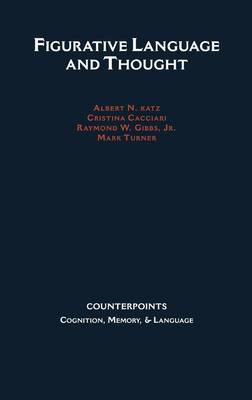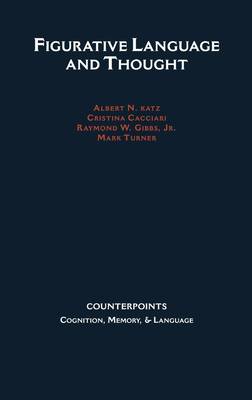
- Retrait gratuit dans votre magasin Club
- 7.000.000 titres dans notre catalogue
- Payer en toute sécurité
- Toujours un magasin près de chez vous
- Retrait gratuit dans votre magasin Club
- 7.000.0000 titres dans notre catalogue
- Payer en toute sécurité
- Toujours un magasin près de chez vous
288,45 €
+ 576 points
Format
Description
Our understanding of the nature and processing of figurative language is central to several important issues in cognitive science, including the relationship of language and thought, how we process language, and how we comprehend abstract meaning. Over the past fifteen years, traditional approaches to these issues have been challenged by experimental psychologists, linguists, and other cognitive scientists interested in the structures of the mind and the processes that operate on them. In Figurative Language and Thought, internationally recognized experts in the field of figurative language, Albert Katz, Mark Turner, Raymond W. Gibbs Jr., and Cristina Cacciari, provide a coherent and focused debate on the subject. The book's authors discuss a variety of fundamental questions, including: What can figures of speech tell us about the structure of the conceptual system? If and how should we distinguish the literal from the nonliteral in our theories of language and thought? Are we primarily figurative thinkers and consequently figurative language users or the other way around? Why do we prefer to speak metaphorically in everyday conversation, when literal options may be available for use? Is metaphor the only vehicle through which we can understand abstract concepts? What role do cultural and social factors play in our comprehension of figurative language? These and related questions are raised and argued in an integrative look at the role of nonliteral language in cognition. This volume, a part of Counterpoints series, will be thought-provoking reading for a wide range of cognitive psychologists, linguists, and philosophers.
Spécifications
Parties prenantes
- Auteur(s) :
- Editeur:
Contenu
- Nombre de pages :
- 208
- Langue:
- Anglais
- Collection :
Caractéristiques
- EAN:
- 9780195109627
- Date de parution :
- 10-09-98
- Format:
- Livre relié
- Format numérique:
- Genaaid
- Dimensions :
- 165 mm x 244 mm
- Poids :
- 489 g

Les avis
Nous publions uniquement les avis qui respectent les conditions requises. Consultez nos conditions pour les avis.






